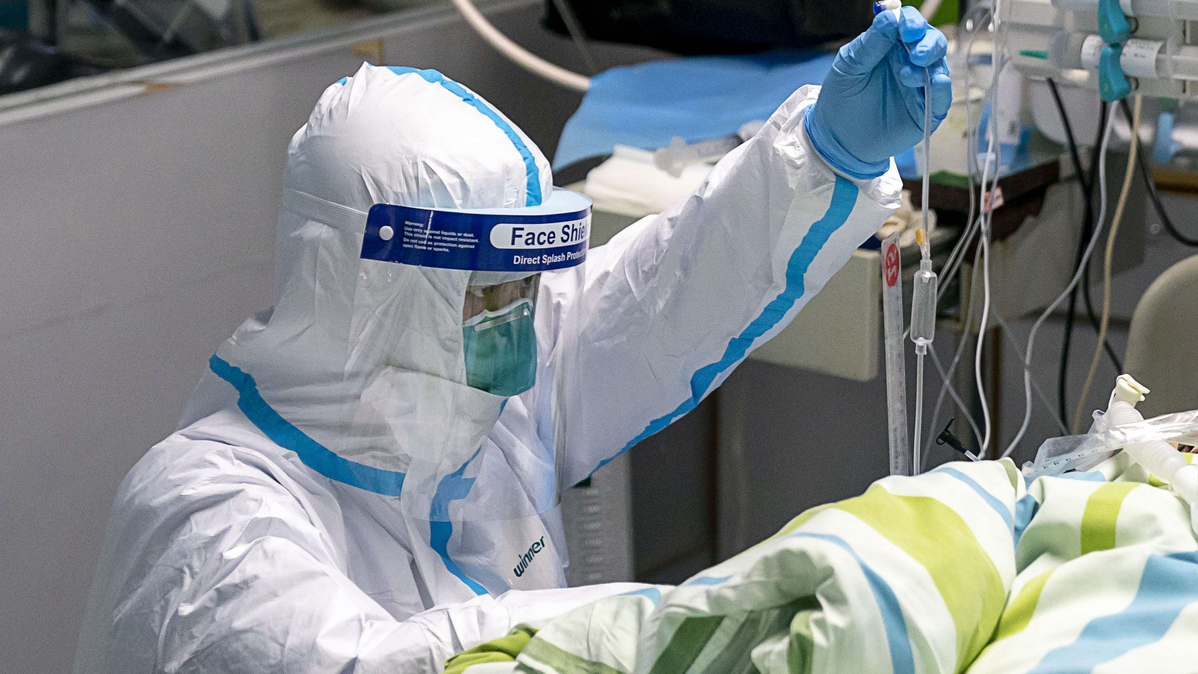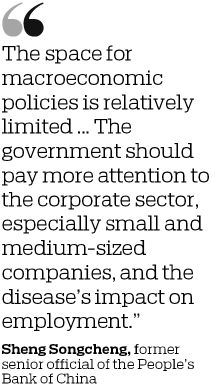Economists: Stronger countermeasures needed to protect corporate sector


Economists called for stronger countermeasures to safeguard the relatively fragile corporate sector in the face of fallout from the novel coronavirus.
Companies in some industries, such as catering, retail, tourism and transportation, may be severely affected by the epidemic in the coming months, and without government support some small and micro companies may be under pressure to shut down, Ma Jun, a member of the central bank's monetary policy committee, told China Daily on Sunday.
It is urgent to coordinate fiscal policy, such as tax exemptions and subsidies, with financial measures to ease the economic stress, Ma said.
It has been more than a month since the first case of the SARS-like virus was reported in Wuhan, Hubei province, and the confirmed and suspected cases have continued to climb. The number of confirmed cases nationwide has exceeded that of SARS in 2003, and economists predicted the new virus may bring more serious consequences for the world's second-largest economy this time.
China's trade tensions with the United States were temporarily eased when they signed the first phase of a trade agreement in mid-January. But analysts said the coronavirus could deal a more severe blow to China's economy in the near term.
"The space for macroeconomic policies is relatively limited, compared with during the SARS episode in 2003," said Sheng Songcheng, a former senior official of the People's Bank of China, the nation's central bank. "The government should pay more attention to the corporate sector, especially small and medium-sized companies, and the disease's impact on employment."
Sheng suggested strengthening countercyclical measures, especially in terms of fiscal policy, to offset economic shocks. "The government's fiscal deficit ratio can be raised to at least 3 percent this year."
In terms of financial measures, the central bank will inject 1.2 trillion yuan ($173 billion) into financial markets on Monday, the first trading day after the Lunar New Year holidays, to prevent unexpected market fluctuations and ensure ample liquidity, the People's Bank of China said on Sunday.
The PBOC will inject the funds by buying securities from financial institutions. The liquidity in the banking system will be 900 billion yuan more compared with the same period last year, the PBOC said.
PBOC and other financial regulators ramped up 30 financial measures on Saturday, including credit easing and liquidity injection, to stabilize the economy.
Credit support will focus on private, small and micro-companies, as well as manufacturing producers, a PBOC statement said. The PBOC will give banks 300 billion yuan ($43.4 billion) to help them provide money to companies hit by the virus.
"A priority is to prevent broader exposure of corporate credit risk, and some policies have been launched to ease the credit tension of enterprises' capital chains," Sheng said.
The main purpose of the 30 financial measures introduced in this emergency package is to alleviate the downward economic pressure caused by the epidemic and effectively guarantee the financial support needed for the prevention and control of the epidemic, Ma from the central banks' monetary policy committee said.
Onshore financial markets will reopen on Monday after the extended traditional Spring Festival holiday. Analysts widely predict drops in the equity, bond, commodity and foreign exchange markets, as investor confidence has been seriously influenced by the epidemic.
Monetary authorities will make use of open market operations to hedge against any possible selloffs, according to the PBOC.
The central bank vice-governor also said policymakers will "flexibly adjust repayment of mortgage loans and credit cards". Patients and medical staff who cannot pay back loans on their due dates will not be recorded on the nation's credit information system, and financial institutions should provide them support.
For companies active in preventing and controlling the epidemic, limits for borrowing foreign debt will be canceled, according to the central bank.
Listed companies and corporate bond issuers that have been influenced by the novel coronavirus outbreak can apply for delaying disclosure of their annual financial reports for 2019 until April 30, the PBOC said.
chenjia@chinadaily.com.cn

- HK bets on integrated hub to enhance TCM profile
- China widens net in battle against graft
- New US dietary guidelines trigger widespread concern
- China eyes space leap with record satellite filings
- Team formed to investigate the loss of 29 cultural relics
- Investigation into school uniforms confirms safety of waterproof layer





































